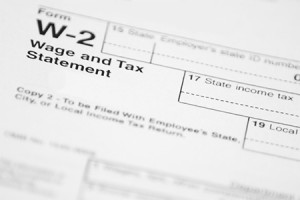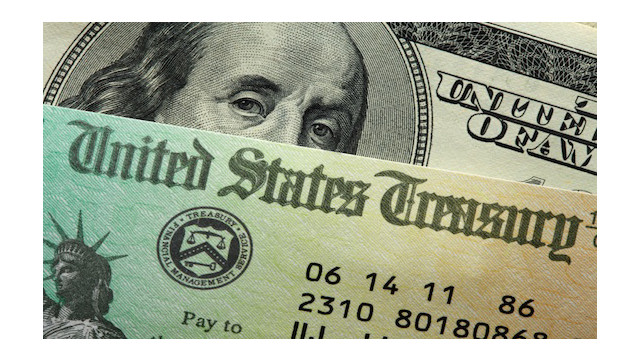Updated: Feb. 12, 2025.
The income tax filing season is just starting, and many people are receiving their W2 and other tax forms. Now that taxes are back on the mind, so are tax refunds! Will President Trump’s second term, new cabinet secretaries and other things affect the taxes you’re filing now? Well, probably not this year, since tax filing season is already underway. Although it is possible that some IRS hiring issues could mildly affect refund processing times.
If you’re wondering how long it may take to get your refund when you finally submit your income tax return, you’re not alone. In fact, for almost 15 years, the question we get the most often has been: “When will I get my tax refund?” Nobody can give you an exact answer, especially this far out, but we can give you a pretty good estimate based on a few factors, and the 50-year collective experience of the CPA Practice Advisor team.
- Related: The Biggest Tax Credit Many People Miss: The EITC
- Related: Taxes to Go Up for Gig Workers: Many Are Unprepared for Lower 1099-K Reporting Threshold
- Related: Taxpayers Warned of New Tax Season Text Message Scam
- Related: Here’s What to Expect for Your Taxes in 2025 and Beyond
Right now, you want to know: “When can I expect to get my tax refund?” – Just scroll down if you want to see the easy chart refund date estimator.
First, keep in mind that you need to wait to file until you receive all of your tax forms from your employer, as well as colleges, mortgages and other documents. If you have complex finances, got married or divorced, had a child, retired, bought or sold a house, own crypto or foreign assets, those will make things more complex. In these situations, you should definitely seek the advice of a tax professional like a CPA or EA in order to make sure you are complying with tax laws and also taking advantage of new or lesser known tax deductions and credits that could benefit you.
But most Americans have pretty simple taxes: A job or two (form W-2), maybe a side gig (forms 1099 or 1099-NEC), some child tax credits, maybe a mortgage or a few minor additions. The chart below is for you.

Short Answer: Depending on when taxpayers file their returns, they can often receive their federal tax refund payment (check or direct deposit) within 10-21 days. If the IRS starts accepting returns at the end of January, as is usual, that means that someone who is able to file right away and are a due a refund, can often see the refund as early as mid- or late February if they have it direct deposited. That’s without an expensive “tax refund loan” or other similar product.
If you have multiple forms of income or certain assets, or certain family situations, you will likely have to wait a bit longer for all of your tax documents to come in before you are able to file. In particular taxpayers might have to wait a little longer if they have:
- The Earned Income Tax Credit,
- Child Tax Credit,
- And a few other credits that require confirmation.
So, here’s the chart you were looking for. If the IRS announces any changes to tax law or potential date changes, we will update this chart. And remember: This is only an estimate of when to expect your refund.
Do not take these dates as exact predictions, as all taxpayers have different tax returns, documents, incomes, and other situations. Note that the first column is when the IRS “accepts” your return, which can be 2-3 days after the day you submitted it electronically, and the IRS will notify you of the actual date on which the agency “accepted” your return (usually by text or email). Mailing in a paper return can result in 3-4 weeks’ extra delay at the beginning of the process, since the IRS will need to enter it into their computer systems manually.
Estimated 2025 IRS Income Tax Return Chart
| If the IRS Accepts an E-Filed Return By: | Then Direct Deposit refund may be received as early as 10 days after e-file accepted. (E-filed, but paper check mailed apx. 1 week after that): |
|---|---|
| The IRS started accepting returns on Jan. 27, 2025. | |
| Jan. 27, 2025 | Feb. 7 (Feb. 14)** |
| Feb. 3 | Feb. 14 (Feb. 21)** |
| Feb. 10 | Feb. 21 (Feb. 28)** |
| Feb. 17 | Feb. 28 (Mar. 7)** |
| Feb. 24 | Mar. 7 (Mar. 14) |
| Mar. 3 | Mar. 14 (Mar. 21) |
| Mar. 10 | Mar. 21 (Mar. 28) |
| Mar. 17 | Mar. 28 (Apr. 4) |
| Mar. 24*** | Apr. 4 (Apr. 11)*** |
| Mar. 31*** | Apr. 11 (Apr. 18)*** |
| Apr. 7 *** | Apr. 18 (Apr. 25)*** |
| Apr. 14*** | Apr. 25 (May 2)*** |
** = Returns with EITC or CTC may have refunds delayed until March to verify credits.
*** = Filing during peak season (late March through April 15) can result in slightly longer waits.
| IRS Accepts Return By: | Direct Deposit Sent (Or Paper Check Mailed one week later) |
|---|---|
| Apr. 21 | May 2 (May 9) |
| Apr. 28 | May 9 (May 16) |
| May 5 | May 16 (May 23) |
| May 12 | May 23 (May 30) |
| May 19 | May 30 (June 6) |
If your IRS income tax refund is delayed after you’ve filed, ask your tax professional, or simply use the “Where’s My Refund?” tool on the IRS website to check the status of your refund. Or you can download the IRS2Go app to check your refund status. It’s a good idea to e-file your tax return as soon as you have all of your tax documents (like your W2, 1099s, mortgage and student loan interest, and other items) as e-filing generally ensures a faster turnaround time.
Several factors can determine when a taxpayer might receive his or her tax refund, including:
- How early the return is filed;
- If the taxpayer is claiming certain credits (especially EITC and CTC);
- Whether the return is e-filed or sent by mail;
- Whether the taxpayer has existing debts to the federal government.
Be Safe – Hire a Professional
Taxpayers who use a professional, such as a CPA or EA, can ask that professional for the estimated date of their tax refund, and they can be more confident that their taxes have been properly (and legally) filed. (And you can often save, or get a bigger refund, by using a professional.)
There are also apps for Apple, Android and other devices that help track refund status.
What If You Can’t File Your Income Taxes By April 15?
Any taxpayer who can’t file their return by April 15 for any reason (such as they don’t have all of the paperwork needed in order to file their taxes) can easily file an extension form, “Form 4868, Application for Automatic Extension of Time to File U.S. Individual Income Tax Return.” (Link to IRS Form 4868.) Any tax pro can help you with this, as well. This will give the taxpayer until October 15, 2025, to file the federal tax return. No reason or excuse is needed to receive this extension, and as the title states, it is automatically granted. Be sure to check the extension rules for your particular state as the extension date may differ from the date for the federal return extension.
Note that if a person will owe taxes with the tax return, it is still that taxpayer’s obligation to pay those taxes by April 15, 2025, even if an extension to file has been requested. A tax professional can assist with this payment process. Those who are due a refund generally only need to file the extension request by April 15, 2025. Any tax professional and most do-it-yourself tax programs can perform this task.
Tax Refund Estimators:
- https://turbotax.intuit.com/tax-tools/calculators/taxcaster/
- https://www.taxact.com/tools/tax-calculator
Thanks for reading CPA Practice Advisor!
Subscribe Already registered? Log In
Need more information? Read the FAQs
Tags: 2025 income tax due date, 2025 income tax refund, 2025 income taxes, 2025 refund, 2025 tax credits, 2025 tax deductions, 2025 tax filing season, 2025 tax refund, 2025 tax season, 2025 taxes, 2025 trump tax refund, bigger tax refund in 2025, facebook where's my refund, income tax refunds, IRS 2025, IRS refund schedule 2025, tax refund date estimator, tax refund loan, tax refund schedule 2025, tiktok tax refund 2025, tiktok tax refund dates, tiktok where's my tax refund, twitter where's my tax refund, when will i get my tax refund, where's my refund





robert ashner January 24 2025 at 12:23 pm
thank you. can i get taxes done with a cpa. or volunteers to help